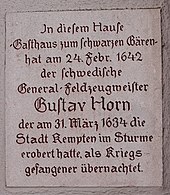Gustaf Horn

Gustaf Karlsson Horn , Count of Björneborg (born October 22, 1592 in Örbyhus near Uppsala , † May 10, 1657 in Skara ) was a Swedish general in the Thirty Years War .
Life
Career
Horn first studied in Rostock , Jena and at the University of Tübingen and then entered the military under King Gustav Adolf . He captured Dorpat in 1625 and was then commander-in-chief of the Swedish-Finnish troops in Livonia .
In 1630 he came to Germany with King Gustaf Adolf and in 1630 took the Kolberg fortress . During the advance on Frankfurt an der Oder in May 1631, he commanded half of the Swedish army . In the first battle of Breitenfeld in September 1631 he commanded the left wing. Then he advanced south with his troops. On December 20, 1631, Horn stood at the gates of Mergentheim , which surrendered after five days. Horn then moved with his troops to Heilbronn , where the Swedes moved in on January 2, 1632. Gustav Adolf presented his general with the possession of the Teutonic Order enclave Stockheim , plundered by Swedish troops on Christmas Day 1631 , which became Swedish for three years until the Swedish defeat in Nördlingen in 1634. On January 4, 1632, Horn moved on to Würzburg . Imperial mercenaries under the command of Count von Tilly had to fight in the Battle of Rain am Lech on 14./15. April 1632 give Swedish units defeated under the command of Gustaf Horn.
In the autumn of 1632, Horn occupied parts of Alsace up the Rhine and besieged the Breisach fortress for months . After Gustav Adolf's death in the Battle of Lützen in November 1632, Horn and Banér took over the military leadership of the Swedish army, while his father-in-law Count Oxenstierna took over the government.
The rivalry with Bernhard von Sachsen-Weimar , who challenged him for the supreme command of the Swedish army in southern Germany, already grew in the course of 1633, when both generals were initially involved in the planned campaign to Regensburg , but their armies then each other separated. A year later, the rivalry was one of the reasons for the defeat of the Protestants in the Battle of Nördlingen on September 6, 1634, which meant the end of Swedish supremacy in Germany. Horn had strongly advised against this argument. Horn was captured near Nördlingen and imprisoned at Burghausen Castle in what is now Upper Bavaria . He was only released in 1642 in exchange for Johann von Werth and returned to Sweden.
In 1644 he led General Torstenson again to help an army to Skåne in southern Sweden, thereby compelling the Danes to bring peace to Brömsebro . Horn was also held in high regard under Queen Christine and King Charles X.
He became President of the War College and in 1653 Reich Marshal . Finally he administered Livonia and Skåne as governors . Horn died in Skara on May 10, 1657.
family
Horn was the youngest son of the Swedish field marshal , governor and imperial councilor Carl Henriksson Horn af Kanckas († 1601) and Agnes, née von Dellvig († 1611). The Horns were originally a Finnish nobility. He had three older brothers: Henrik Horn , Evert Horn and Klas Horn , who in 1631 became the first governor-general of Swedish-occupied Pomerania . Gustaf Horn was married twice. In 1628 he married Kristina Oxenstierna (1609–1631), daughter of the Swedish Chancellor Axel Oxenstierna. After her death in 1644 he married Sigrid Bielke (1620–1679). Children:
- Agneta (1629–1672), ⚭ Lars Jesper Kruuse (1621–1656)
- Axel (1630-1631)
- Anna Katarina (* / † 1644)
- The twins Kristina and Ebba Sigrid (* / † 1646)
- Helena (1647-1648)
- Maria Eleonora (1648-1652)
- Karl Gustaf (1650-1654)
- Evert (1652-1654)
- Eva (1653–1740), ⚭ Nils Bielke (1644–1716) on Salsta
- Hedvig Louise (1655-17?)
- ⚭ Ture Karlsson Sparre (1654–1683)
- ⚭ 1689 Bernhard von Liewen (1651–1703)
literature
- Topor Morawitzky: Captivity of the Kgl. Swedish Field Marshal Gustav Horn in the castle at Burghausen from 1634-1641. Munich, 1857. ( books.google.de )
- Gustaf Horn . In: Theodor Westrin (Ed.): Nordisk familjebok konversationslexikon och realencyklopedi . 2nd Edition. tape 11 : Harrisburg – Hypereides . Nordisk familjeboks förlag, Stockholm 1909, Sp. 1116 (Swedish, runeberg.org ).
Remarks
- ↑ The progenitor of the Finnish Horn, also called the Hornatten , was Olof Mattsson, 1381–1415 lord of Åminne near Halikko in Finland. Lines were the Horn af Kanckas (near Masku , Finland), Horn af Björneborg (a crown estate in Finland), Horn af Marienborg (Livonia) and Horn af Ekebyholm (near Norrtälje , Sweden); see Hornatten (Swedish article). They are not to be confused with the Swedish but originally Pomeranian Horn af Rantzien .
| personal data | |
|---|---|
| SURNAME | Horn, Gustaf |
| ALTERNATIVE NAMES | Horn, Gustaf Karlsson (full name) |
| BRIEF DESCRIPTION | Swedish general in the Thirty Years War |
| DATE OF BIRTH | October 22, 1592 |
| PLACE OF BIRTH | Orbyhus |
| DATE OF DEATH | May 10, 1657 |
| Place of death | Skara |
